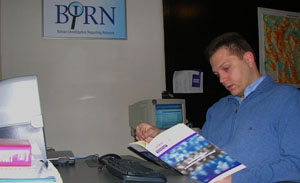You are here » Home » Telling Our Story
Success Story
Guide outlines how investigative journalists can refine their reporting
Manual Helps Media Fight Corruption

Photo: CCC/Elena Ristevska
Sinisa Marusic, of the Balkan Investigative Reporting Network, consults a manual developed with USAID support on how to report on corruption cases.
German Filkov, president of the Center for Civil Communications, said, “Further improvement of the Macedonian media capacity in the fight against corruption remains one of our key goals, along with our intention to establish an informal network of investigative journalists in the near future.”
The Center for Civil Communications has worked on reducing corruption in the Republic of Macedonia by equipping journalists with enhanced skills and techniques for investigating and reporting on corruption. The in-depth investigative stories of well-trained journalists reinforce the fight against corruption, since better informed citizens demand more from their elected officials.
With USAID support, the center trained staff members from eight leading local electronic and print media throughout Macedonia in investigating and reporting on corruption cases. The center’s workshops on defining measures to decrease corruption showed the need for more journalists to hone techniques for investigative journalism. So, in order to reach more journalists, it published a manual on investigating and reporting on corruption.
The manual covers forms and patterns of corruption in the most vulnerable areas, investigative journalism techniques and ways to discover sources and conduct interviews. In addition, it points to the consequences of corruption and the role of the media in suppression.
Sinisa Jakov Marusic, an investigative journalist for the Balkan Investigative Reporting Network’s online publication, Balkan Insight, said, “When investigating corruption and crime, one must be careful to use only sustainable evidence to make the story credible. How to find this evidence, how to sort it out and how to use it, are some of the many obstacles on this path. The manual helped me perform all these steps, systematically go through all the phases of the research process, and use them to my advantage... I have become more efficient and successful in my work.”
By using the manual in their everyday work, journalists can inform the public about corruption in a more comprehensive and objective manner, thus putting more pressure on authorities to reinforce measures for preventing corruption and sanctioning perpetrators.
Print-friendly version of this page (533kb - PDF)
Click here for high-res photo
Back to Top ^
|




